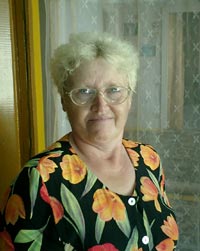









 Elsa Ivanovna Vlasova, maiden name Schwenk, born 1955
Elsa Ivanovna Vlasova, maiden name Schwenk, born 1955
Parents: Maria Yakovlevna Schwenk (maiden name Schreder (Schröder?) or Schreide), born 1927, and Ivan Ivanovich Schwenk, born 1927.
Maria Yakovlevna lived in the village of Bauer, Saratov Region; Ivan Ivanovich was from a village (or one of the scattered farmsteads) situated about 6 kms away from Bauer. He was the son of a farmer.
They learned about the planned banishment on the 21 August 1941; their deportation was carried out on the 23 August 1941 (annotation made by Aleksei Babiy: this is very strange, as the ukase about the deportation was only issued on the 28 August; however, Elsa Ivanovna affirms that it happened exactly this way: Maria Yakovlevna’s parents had left for Saratov to buy some schoolbooks for the new term; they purchased an entire basket full of books, and when they returned home, they weredisplaced immediately). 1941 was a banner year for crops; there was enough room for hope that nobody was to suffer from hunger this year.
Apart from Maria there were another two children – Ewa and Valya, as well as a child of three months, which died during the trip. The people were transported in freight cars actually used for cattle, their were not plank-beds. The waggons had not even been cleaned from the last animal transport; they had just thrown a plenty of straw on the floor, where more than 100 deportees had to sleep lying all in a tumble. Every time the train stopped at a station, they carried out dead bodies.
They had taken along nothing but a few pieces of underwear and some foodstuffs. Before leaving their village, they had received receipts regarding their confiscated property: house, cattle, etc. Upon arrival in the new place of residence, to return these receipts – together with all personal documents; and they did not receive any compensation for the lost property.
Maria Yakovlevna’s father was mobilized to the trudarmy in the Kemerovo Region, were he nearly perished – he was released. He managed to get up to Kuragino District, where his relatives lived. Still being on the mend, he was called up to the trudarmy once again, but soonafter dismissed definitely; he returned to his family.
The remaining family members (among them Maria Yakovlevna) were taken to Sergeevo (island between Nazimovo and Nizhneshadrino) by barge. In 1942 they were transferred to Fomka. At first they had to live in dog-outs; later they built barracks. Four families (18 individuals) were accomodated in one room (about 15 sqm). They slept on plank-beds constructing a second “floor” for the children; the adults slept on the lower beds.
During the first time they were called fascists, but then normal life got going. Except for an event: when late in the 1970s Elsa Ivanovna’s sister intended to get married to a Russian (the wedding gown had already been sewn), the bridgrooms grandmother violently entered the objection: either I or this fascist. They refrained from celebrating their marriage. Germans were not drafted until the 1970s, either, which meant an immense abasement to them. And even after 1956 they were compelled to accept numerous restrictions – just for being Germans.
They were working for the timber industry in Fomka without being paid any wages; they did hard labour, in order to get their daily ration. They were counting so-called “sticks” – a kind of daily work units. The local residents contributed used clothes, and those, who had to work outside in the forest received mittens and quilted trousers.
The women were mainly engaged in needlework; they did the laundry and bleached the linen – in order to earn their living. They tried to earn a bit extra by knitting and crochetting. Maria Yakovlevna’s brother, who was already born in Siberia, died in his childhood.
Exiled Kalmyks, Finns, Letts and Ukrainians lived in Fomka, as well. The circumstances of the deportation and serious problems to cope with the new place of residence turned out to be particularly unbearable for the Kalmyks – they all perished.
Elsa Ivanovna mentioned the following surnames of special resettlers who lived in Fomka:
Ivan Ivanovich Schwenk got to Sotino (downriver from Nikulino). But soonafter, he and some other lads went on the run leaving the place on board a steamship (they had successfully bribed the captain). The money they gave him was just enough to get up to Yartsevo, where officials of the commandant’s office caught hold of them; they did not send Ivan Ivanovich back to Sotino, but to Fomka. Father and mother married in 1952. They stayed in Fomka until 1978 and then removed to Ust-Kem. The father died in 1990; Elsa Ivanovna’s mother and daughter live in Germany. Elsa Ivanovna and her husband spent six years in Germany, too (until 2004), but they did not feel comfortable: they were unable to speak the language, had no work. They decided to return to Ust-Kem (fortunately, they had not sold their house, so that they disposed of free accomodation immediately).
Interviewed by Aleksei Babiy
(AB – comments by Aleksei Babiy, Krasnoyarsk “Memorial”)
Forth expedition of history and human rights, Ust-Kem 2007